
The_Economist_15_12_2018_watermark
.pdf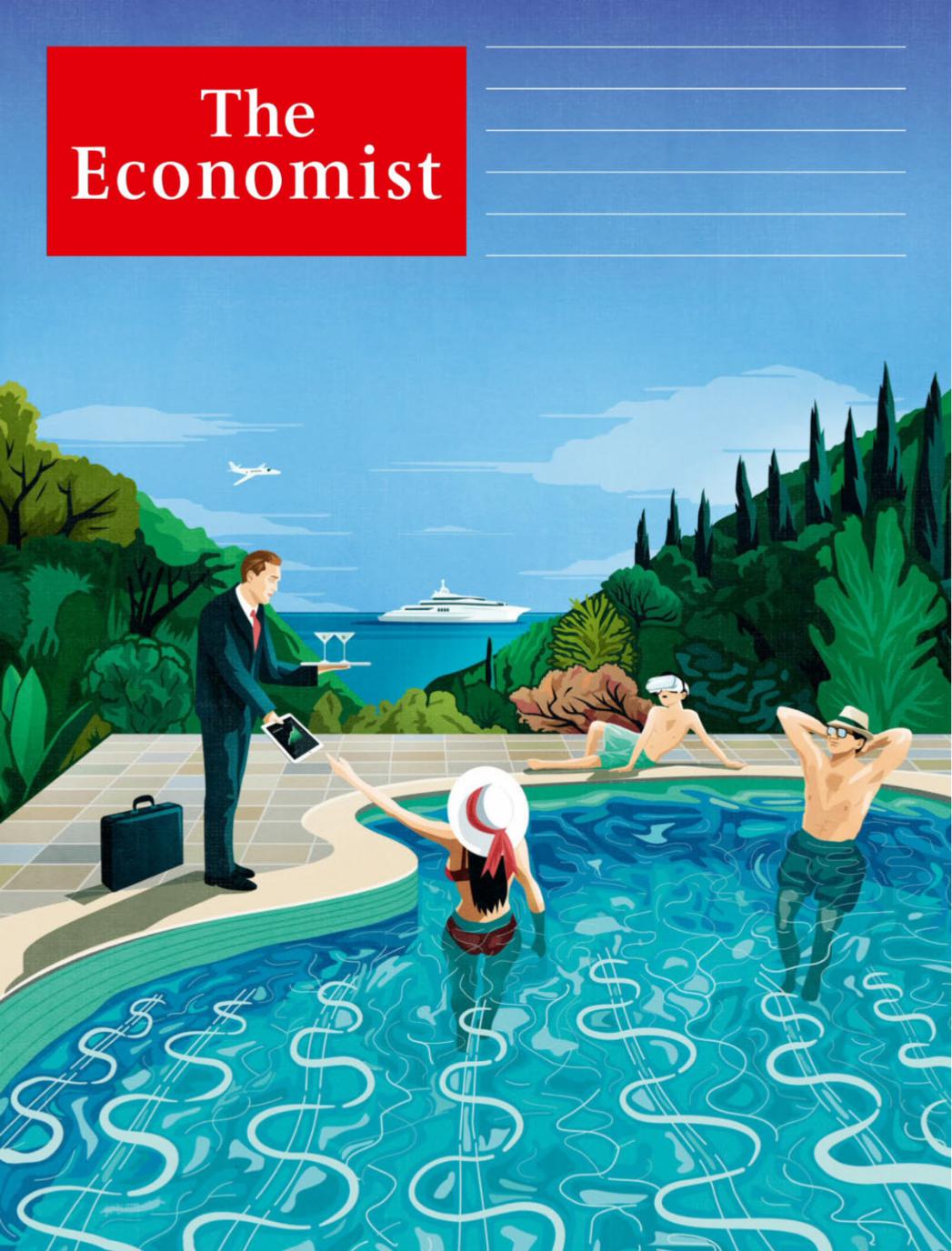
vk.com/id446425943
Theresa May staggers on
A new Powell doctrine
Doing a Putin in Congo
Can Huawei survive?
DECEMBER 15TH–21ST 2018
How the super-rich invest
The rise of the family office
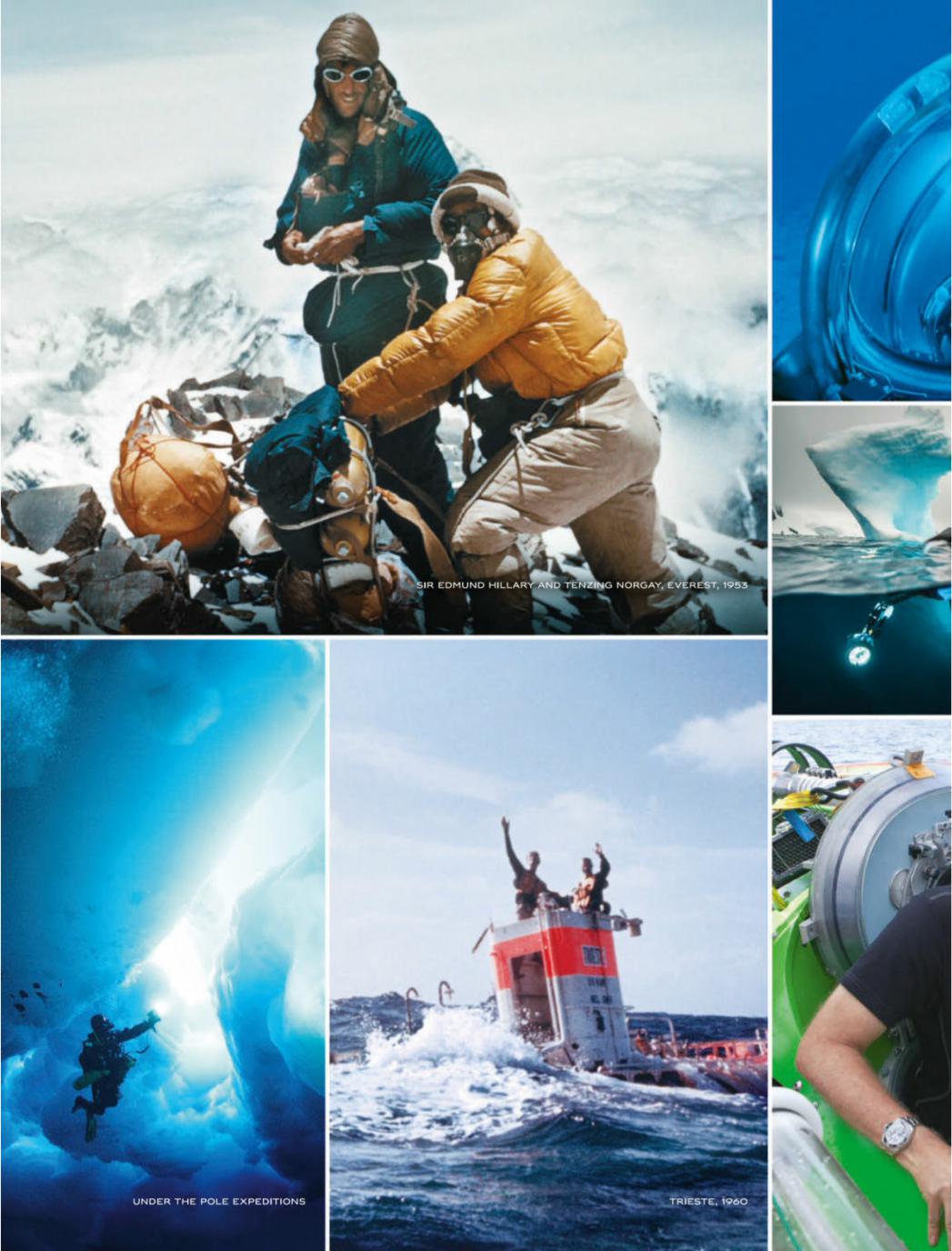
vk.com/id446425943
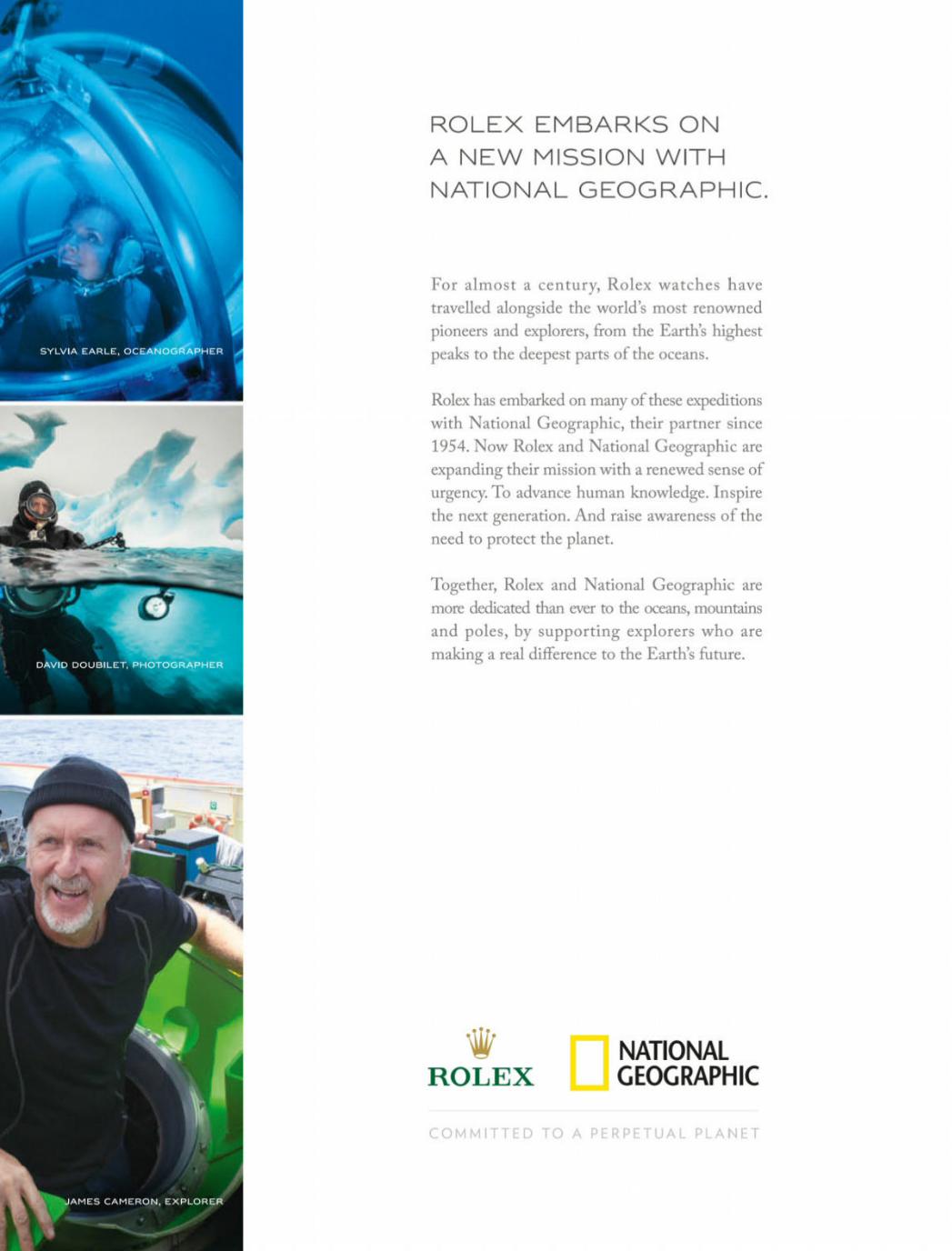
vk.com/id446425943
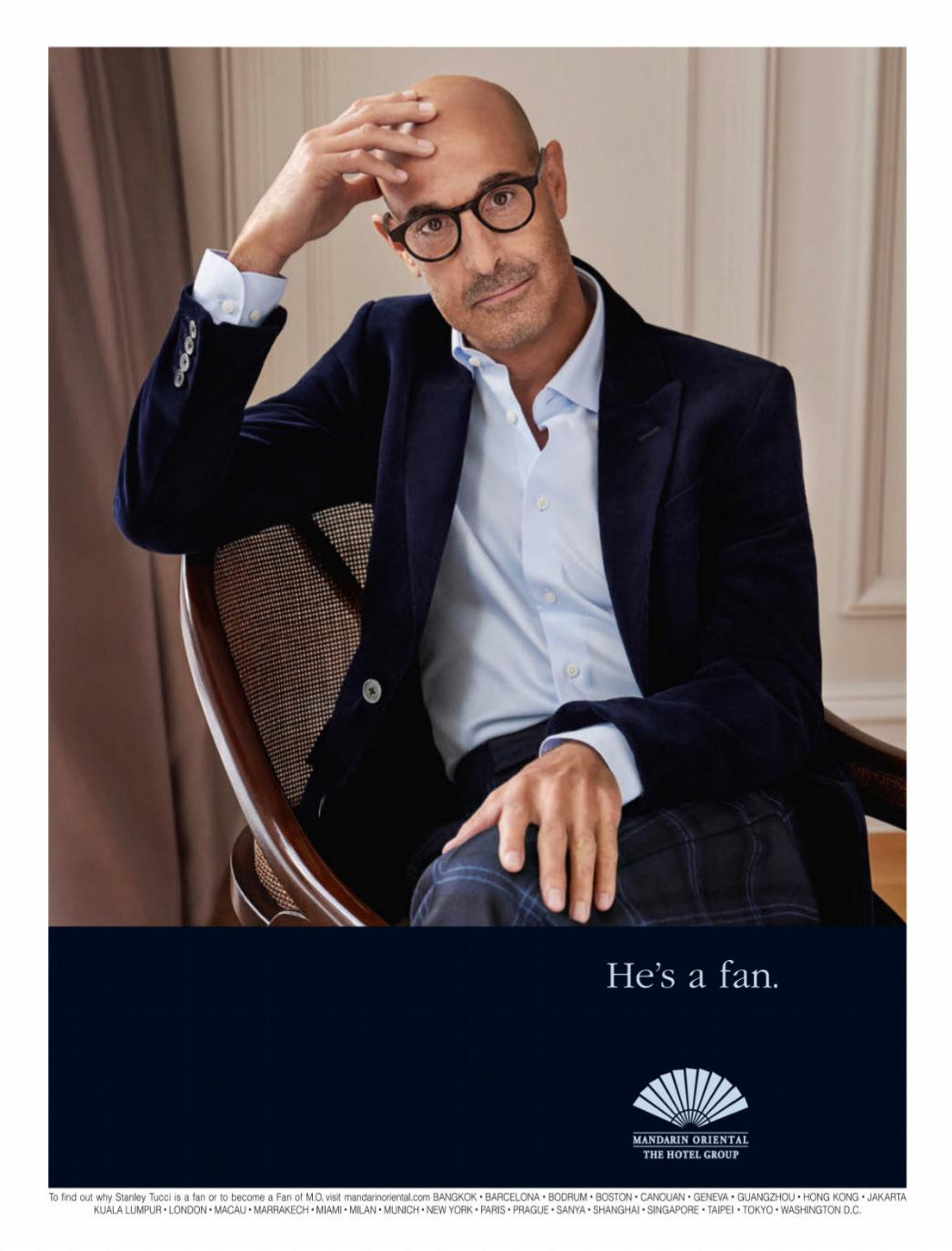
vk.com/id446425943
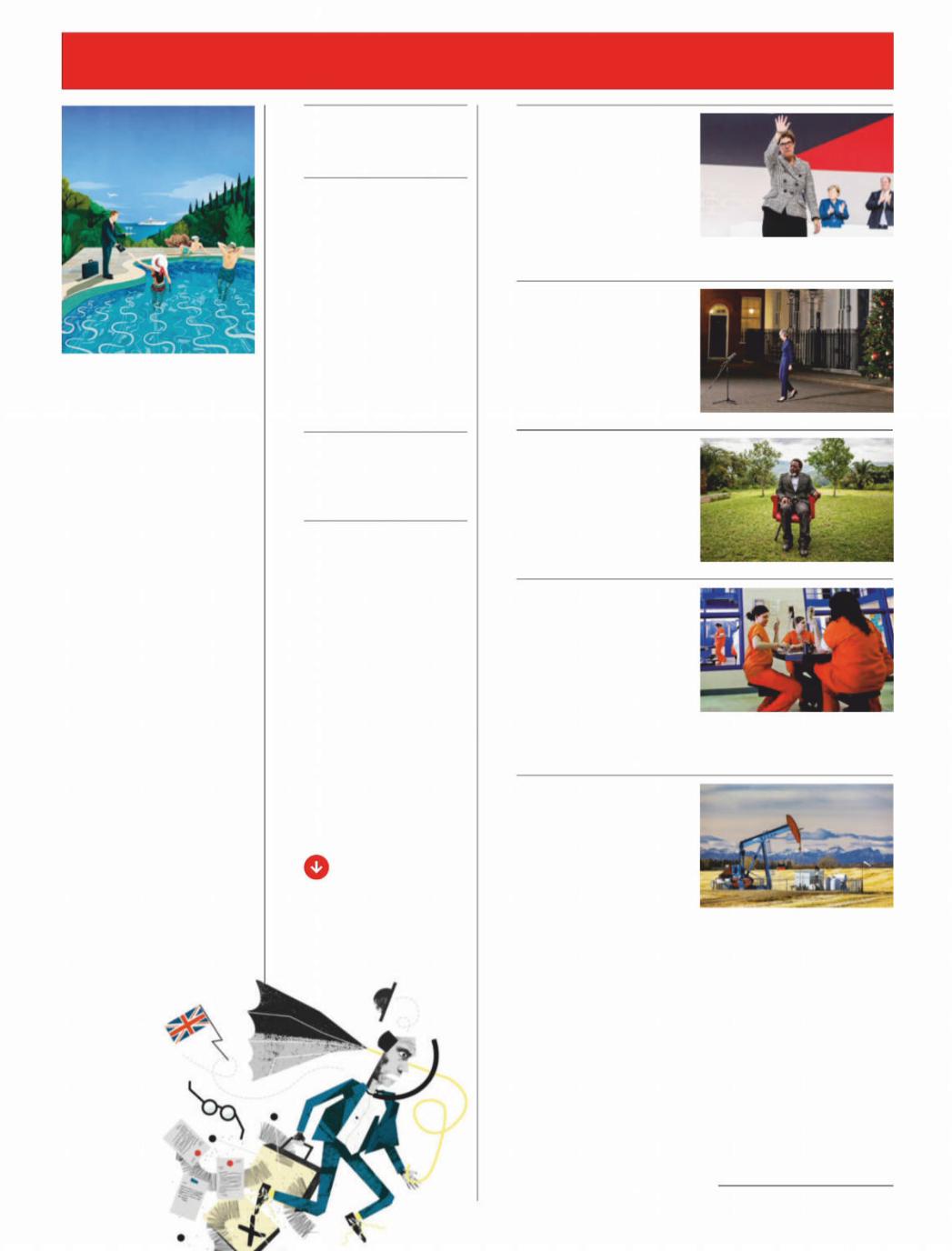
vk.com/id446425943
Contents
On the cover
The family offices through which the world’s richest invest are a new force in global finance—and a target for populists: leader, page 13. Billionaires’ in-house investment teams are joining
the world’s financial titans, page 22
•Theresa May staggers on A real lesson from her bruising week: leader, page 14. Britain’s prime minister wins her party ’s confidence vote. But her chances of winning parliamentary backing for her Brexit deal seem ever more remote, page 31
•A new Powell doctrine The Federal Reserve needs a new strategy if it is to get out of a tight spot: leader, page 16
•Doing a Putin in Congo
President Joseph Kabila is engineering a Kremlin-style charade of an election: leader, page 17. He looks set to go on calling the shots once his nominee is elected in his place, page 35
•Can Huawei survive? China’s best-known tech company faces an onslaught of bans and restrictions in foreign markets, page 58
The world this week
8A round-up of political and business news
Leaders
13Asset management
The super-rich
14Theresa May
Very rocky
16France
Surrender, or tactical retreat?
16Monetary policy
Needed: a Powell doctrine
17Congo’s election
The Kremlin-style charade in Kinshasa
Letters
20On competition, housing, the IMO, Bangladesh, Sacha Baron Cohen
Briefing
22Family o ces
Super-help for the super-rich
Bagehot Across the world, Anglophilia is giving way to Anglobemusement— and Angloexasperation, page 34
The Economist December 15th 2018 5
Europe
25The AKK era begins
26Macron’s peace o ering
27Turkey’s new bogeyman
27Lesbians on Lesbos
28Ireland’s recovery
30Charlemagne France and Germany
Britain
31Theresa May wins her confidence vote
32Democracy in Sark
34Bagehot As others see us
Middle East & Africa
35A farce in Congo
36Jihadism in west Africa
37Looting South Sudan
37Yemen peace talks
38Miracles in Lebanon
United States
39Criminal-justice reform
40White House whirlwinds
41POTUS and WOTUS
41Michael Cohen sentenced
42McCarthy in the museum
43Fixing Kansas
44Lexington The Saudi alliance
The Americas
45Canada’s energy
46Living like a guerrilla
47Bello Venezuela
1 Contents continues overleaf
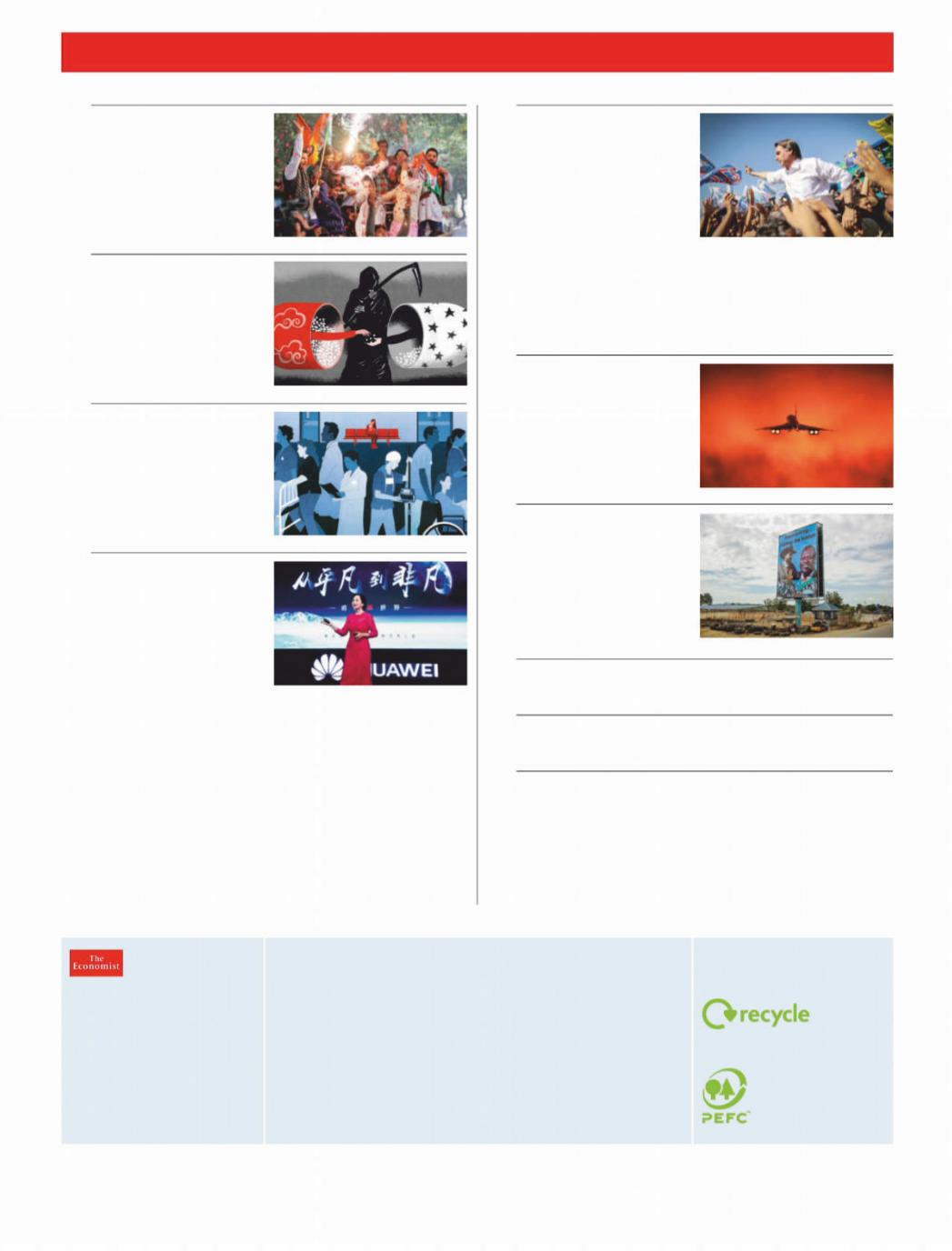
vk.com/id446425943
6Contents
Asia
49India’s opposition
50Banyan Fiji’s future
51Online rights in Australia
51Myanmar’s meth boom
China
53Fentanyl labs
54A chief for every river
55Chaguan When doves cry
International
56How the rich world cares for new mothers
Business
58Vulnerable Huawei
59Altria and cannabis
60Bartleby Icing out women on Wall Street
61Reform and Japan Post
61The decline of Vice
62Winemaking in India
63PayPal’s full wallet
64Schumpeter Holding business to account
The Economist December 15th 2018
Finance & economics
65Brazil’s pensions problem
66Argentina’s bad year
67Art-auction guarantees
67India’s new central-bank governor
68Agribusiness and tari s
69Insuring farmers in Africa
70Buttonwood Market timing
71Free exchange China v USSR
Science & technology
73A new supersonic jet
74Gene-editing and ethics
75Town frog, country frog
Books & arts
76South Sudan’s bloody birth
77Mile-high fiction
78How English football got rich
78America’s opioid crisis
79Reproducing masterpieces
Economic & financial indicators
82Statistics on 42 countries
Graphic detail
83GDP predictions are reliable only in the short term
Obituary
84Lyudmila Alexeyeva, doyenne of Russian human rights
Volume 429 Number 9122
Published since September 1843
to take part in “a severe contest between intelligence, which presses forward,
and an unworthy, timid ignorance obstructing our progress.”
Editorial offices in London and also:
Amsterdam, Beijing, Berlin, Brussels, Cairo, Chicago, Johannesburg, Madrid, Mexico City, Moscow, Mumbai, New Delhi, New York, Paris, San Francisco, São Paulo, Seoul, Shanghai, Singapore, Tokyo, Washington DC
Subscription service
For our full range of subscription offers, including
digital only or print and digital combined, visit: |
One-year print-only subscription (51 issues): |
|
|
||
Economist.com/offers |
Euro-zone countries |
€229 |
Please |
|
|
You can also subscribe by post, telephone or email: |
|
||||
Denmark.................................................................... |
DKr 1,709 |
|
|
||
Post: |
The Economist Subscription |
Hungary................................................................. |
HUF 78,042 |
|
|
Norway....................................................................... |
NKr 1,839 |
|
|
||
|
Services, PO Box 471, Haywards |
Poland.......................................................................... |
PLN 1,011 |
|
|
|
Heath, RH16 3GY, United Kingdom |
Sweden....................................................................... |
SKr 2,089 |
|
|
Telephone: |
+44 (0) 845 120 0983 or |
Switzerland................................................................... |
SFr 296 |
|
PEFC certified |
Turkey................................................................................ |
TL 814 |
|
This copy of The Economist |
||
|
+44 (0) 207 576 8448 |
Other Europe (ex UK) ................................................... |
€229 |
|
is printed on paper sourced |
Email: |
customerservices |
Middle East-GCC...................................................... |
US $352 |
|
from sustainably managed |
South Africa......................................... |
ZAR 4,670, US $285 |
|
forests certified by PEFC |
||
|
@subscriptions.economist.com |
Middle East and Africa ........................................... |
US $285 |
PEFC/04-31-1267 |
www.pefc.org |
© 2018 The Economist Newspaper Limited. All rights reserved. Neither this publication nor any part of it may be reproduced, stored in a retrieval system, or transmitted in any form or by any means, electronic, mechanical, photocopying, recording or otherwise, without the prior permission of The Economist Newspaper Limited. Published every week, except for a year-end double issue, by The Economist Newspaper Limited. The Economist is a registered trademark of The Economist Newspaper Limited. Printed by Vogel Druck und Medienservice GmbH, Leibnizstraße 5, 97204 Höchberg, Deutschland. France, Numéro Commission Paritaire: 68832 GB. Encart d’abonnement de deux pages situé entre les folios 10 et 130. Rapp. Italia: IMD srl Via Guido da Velate 11 20162 Milano Aut. Trib. MI 272 del 13/04/88 Poste Italiane SpA - Sped Abb Post DL 353/2003 (conv. L. 27/2/2004 n.46) art 1 comma 1 DCB Milano, Dir. Resp. Domenico Tassinari
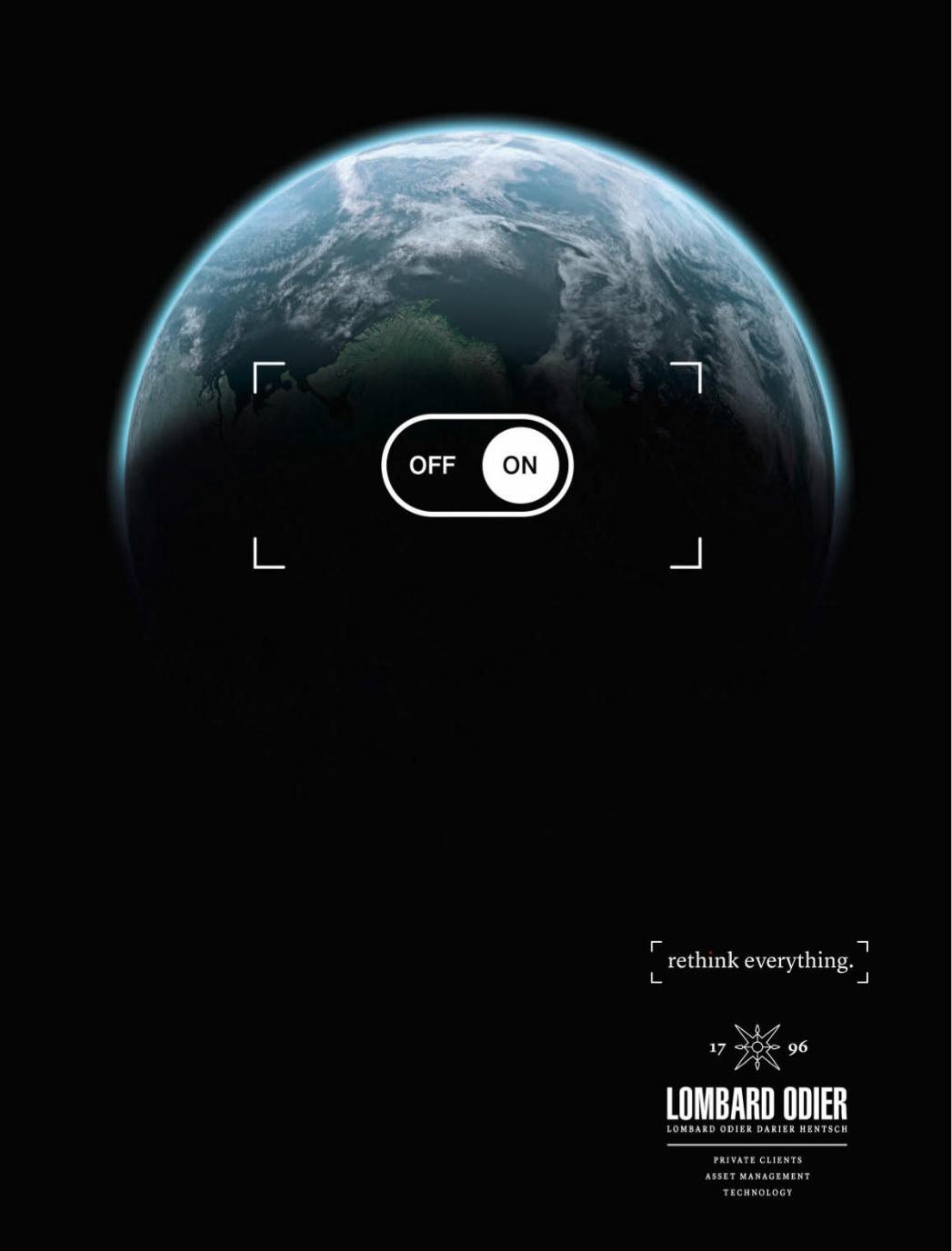
vk.com/id446425943
A spiraling global population, social inequality and finite resources demand a new approach to investment.
By switching to a more sustainable strategy, we believe financial models can secure future prosperity, both for investments and the planet.
Rethink sustainability at
LombardOdier.com
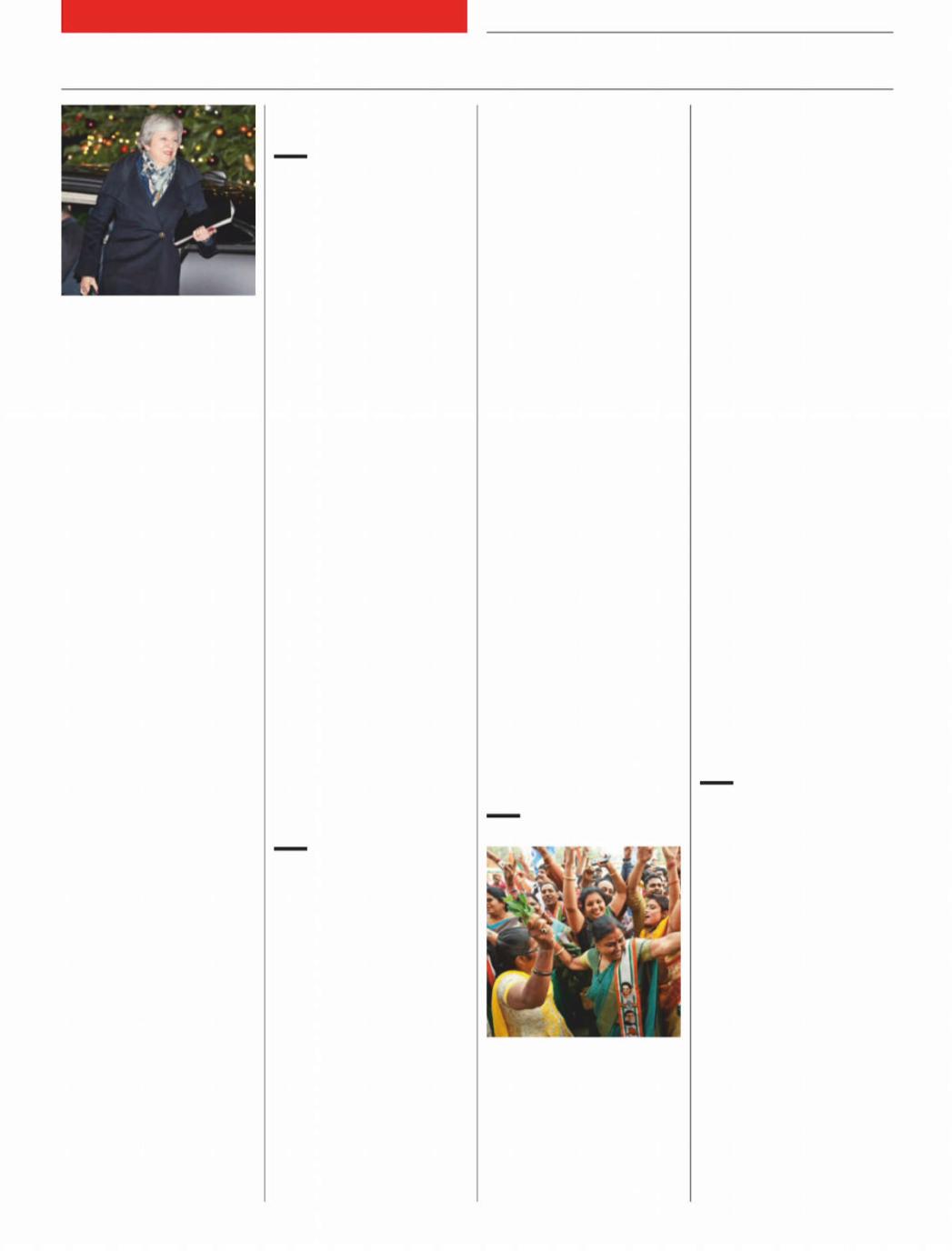
vk.com/id446425943 |
|
8 The world this week Politics |
The Economist December 15th 2018 |
Theresa May, Britain’s prime minister, survived a vote of no confidence in her leadership of the Conservative Party. The vote, which she won with the backing of 200 mps to117, had been called by a group of Tory rebels opposed to her proposed deal to withdraw from the eu, which does not deliver the hard Brexit that they want. To quell the uprising, Mrs May promised to step down as prime minister before the next election in 2022. She had earlier postponed a crucial vote in Parliament on the deal, which has little support among mps from all parties.
Emmanuel Macron again bowed to the gilets jaunes protesters who have been thronging French streets for the past month. Having already agreed to cancel a planned increase in fuel duty, the president went further, promising a €10bn ($11.4bn) package to help the hard-up. More demonstrations are promised, but a poll showed that most French voters approved of his o er.
The day after Mr Macron addressed the nation, a gunman, believed to have been on a terrorist watchlist, opened fire on people at the Christmas market in Strasbourg, killing two. The suspect escaped.
Annegret Kramp-Karrenbauer was chosen as the new leader of Germany’s Christian Democratic Union. She is a protégé of Angela Merkel, who remains chancellor for now.
Nikol Pashinyan, who was catapulted into the prime ministership in Armenia by a wave of protests earlier this year, enjoyed another big victory when his political bloc
won over 70% of the vote in a parliamentary election.
Changing the gatekeeper
Donald Trump announced that John Kelly would step down as White House chief of sta by the end of the year. Mr Kelly, a former marine general, was credited with bringing a modicum of discipline to the presidential o ce. Nick Ayers, Mr Trump’s first choice to replace Mr Kelly, turned down the job, saying he wanted to move back to Georgia with his family.
Following the defenestration of Je Sessions, Mr Trump nominated William Barr as his new attorney-general. Mr Barr is returning to the job he held for14 months under George H.W. Bush. He backs the notion of a strong executive, which could provoke a clash with the special counsel’s investigation. Mr Trump’s pick to succeed Nikki Haley as America’s ambassador to the un is Heather Nauert, a former journalist and flack for the State Department.
Michael Cohen, Mr Trump’s former lawyer, was sentenced to three years in prison for lying to Congress, among other things. Mr Cohen is co-operat- ing with prosecutors and has alleged that Mr Trump asked him to pay hush money to two women who claim to have had flings with the president.
Sensitive to criticism
A court in Rwanda dismissed “baseless” charges of insurrection and forgery brought against Diane Rwigara, a dissident. The prosecution said it would appeal. In 2017 Ms Rwigara was barred from running for election against President Paul Kagame. Also, when she announced her intention to run, hacked naked photos of her promptly appeared on the internet. Mr Kagame won with 98% of the vote.
Joseph Kabila, the president of the Democratic Republic of Congo, refused to rule out standing for election again in 2023 as allowed by the consti-
tution (though he cannot contest elections scheduled for December 23rd). Mr Kabila, who has ruled since 2001, was supposed to have stood down by the end of 2016.
At least two people were killed in Togo amid demands by the opposition for constitutional changes to limit the number of terms that presidents can serve. The current leader, Faure Gnassingbé, has run the country since 2005 when he took over from his father, who had ruled since taking power in a coup in1967 until his death.
Sweden hosted talks between the government of Yemen and the Houthi rebels. The two sides agreed to some confi- dence-building measures, such as the exchange of thousands of prisoners and the reopening of the airport in Sana’a, the Houthi-controlled capital. But fighting on the ground continues.
Turkey said it would launch a new o ensive in Syria against Kurdish militias that are backed by America. The Kurds control swathes of north-east Syria, which borders Turkey. Turkey says the Kurdish militias are part of a terrorist group. The move risks bringing Turkey and America into direct conflict.
Back in the game
Congress, India’s main opposition party, won elections in three states that had previously been controlled by the Bharatiya Janata Party, which runs the national government. The results suggest that next year’s national election will be more competitive than had previously been assumed.
Australia’s parliament approved a law that allows the government to demand that tech firms give access to encrypted online communications, even if the firms have designed their services so that they themselves do not have access to their customers’ conversations. Tech firms said the law is unworkable.
Japan’s parliament voted to allow more than 250,000 foreign workers into the country to help ease a labour shortage. The government insists the measure is not a step towards large-scale immigration, as the new arrivals will only be given five-year visas.
Chinese police reportedly arrested a prominent Protestant pastor, Wang Yi, and members of his unauthorised church in the city of Chengdu. He has reportedly been accused of inciting subversion. In 2006 Mr Wang met George W. Bush in the White House.
Also arrested in China were ten people accused of a “serious attack” on police o cers during a protest in October in Pingdu, a northern city. The demonstrators included army veterans who were calling for better benefits.
Rubber meets road
Goodyear, a tyremaker, said it would halt production in Venezuela, blaming economic conditions. It is the latest in a series of international companies to leave the country, which has seen its economy shrink by half since 2014. Workers will receive ten tyres as severance pay.
Cuba announced last-minute |
|
changes to unpopular new |
|
rules for entrepreneurs, which |
|
recently came into e ect. |
|
Regulations that barred people |
|
from having more than one |
|
business licence, set an upper |
|
limit of 50 patrons in restau- |
|
rants, and required businesses |
|
to deposit 80% of their earn- |
|
ings into bank accounts were |
|
dropped or loosened, to |
|
general relief. |
1 |
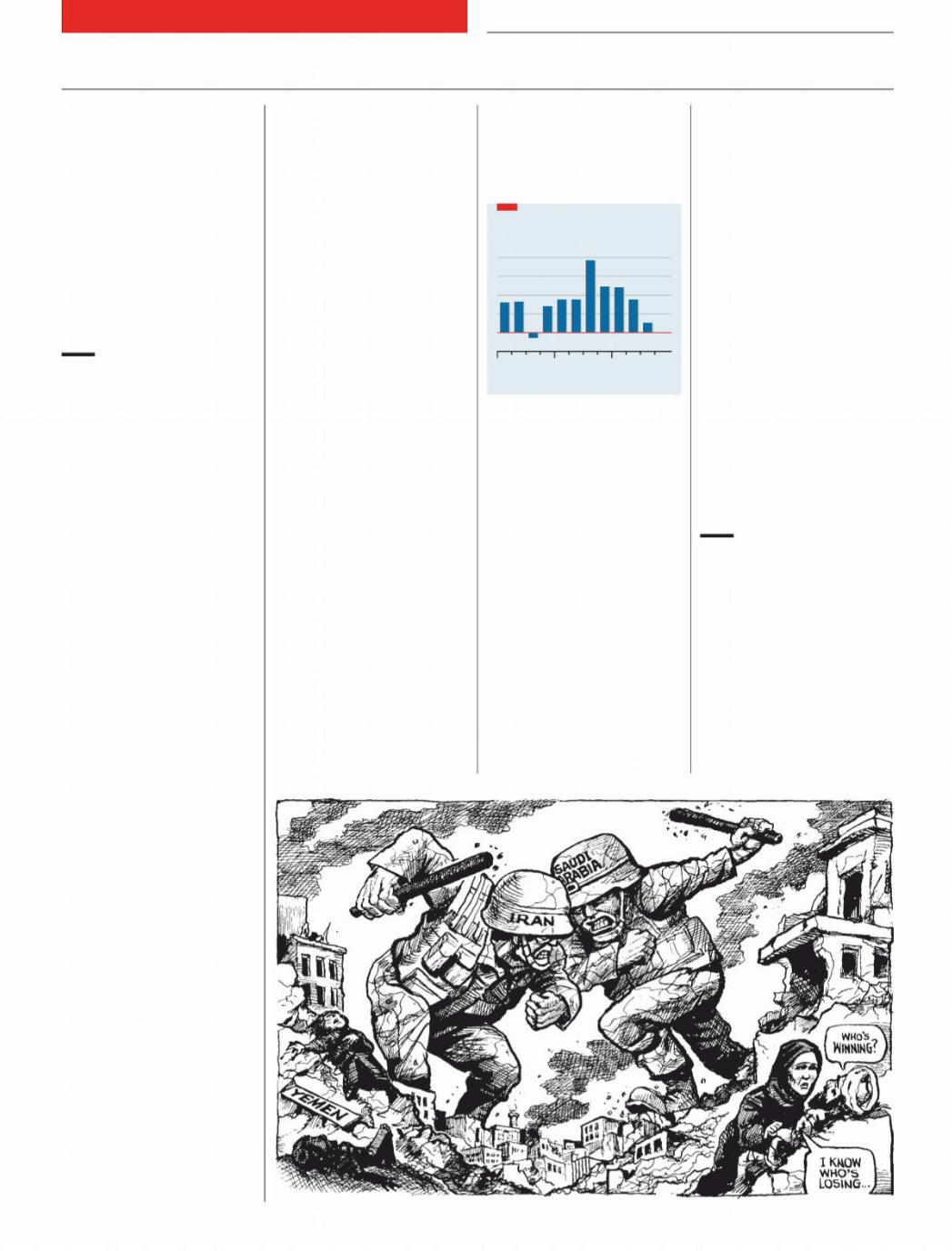
vk.com/id446425943
The world this week Business
The Economist December 15th 2018 9
O cials from America and China began negotiations in the hope of reaching a trade deal before March1st and thus avoid another round of punishing tari s. China reportedly agreed to reduce tari s on imports of American cars from 40% to15%, though it was unclear when that might happen. American exports of vehicles to China have fallen sharply since the imposition of retaliatory duties.
A spanner in the works
The chief financial o cer of Huawei, a Chinese technology company suspected in the West of having deep ties to the Chinese army, was granted bail in Canada following her arrest at the request of the United States. Prosecutors seeking to extradite Meng Wanzhou to America allege that she misled financiers about using an a liate to do business with Iran in violation of sanctions. Donald Trump suggested that he may intervene in the case if it threatened to scupper a trade deal with Beijing. China, meanwhile, detained a former Canadian diplomat, which many observers think is a reprisal for Canada’s actions. A second Canadian was also detained.
A court in China declared that Apple had violated two patents belonging to Qualcomm, and that it had slapped a temporary ban on selling older iPhone models in the country. Qualcomm hailed the decision as a victory in its sprawling global battle with Apple over intellectual property.
Prosecutors in Tokyo brought their first charges against Carlos Ghosn. The architect of the Nissan-Renault-Mitsubishi carmaking alliance is accused of underreporting his pay at Nissan by half in the five years to March 2015, and is under investigation for doing the same in the three years to March 2018. Nissan has also been indicted. Mr Ghosn, who has been sacked by Nissan, was refused bail and will probably remain in custody until at least the end of the year.
Urjit Patel resigned as the governor of India’s central bank amid a spat with the government, which has put pressure on the bank to ease its curbs on lending ahead of a general election next year. The government also wants the Reserve Bank of India to transfer more of its surpluses to the public purse. The new governor is Shaktikanta Das, who headed the Department of Economic A airs during the government’s abrupt withdrawal of large-denom- ination banknotes from circulation in 2016, causing a shortage of cash.
opec and Russia decided to reduce oil production by1.2m barrels a day. The vast bulk of the cuts will be made to output from Saudi Arabia, which wants to use the revenue from the resulting higher oil prices to balance its budget. That incentive overrode pleas from Donald Trump to maintain current production levels in order to keep oil prices low.
Britain’s ground-breaking infrastructure project, Crossrail, received another bail-out, its third this year. The rail line connecting east to west London has been beset by various delays and is now expected to miss its revised launch date in
2019. The problems have made it less likely the £30bn ($38bn) Crossrail 2 project, which would run from south to north London, will go ahead.
Turkey
GDP, % change on a year earlier
12
9
6
3
0
-3
2016 |
17 |
18 |
Source: Haver Analytics
Turkey’s gdp grew by just1.6% year-on-year in the third quarter, the slowest pace since the aftermath of an attempted army coup in 2016. Construction, which accounts for a tenth of the economy, shrank by 5.3%. The country has endured a run on the lira for most of 2018. The government said that demand had “lost its momentum due to diminishing opportunities to secure foreign financing”.
After lengthy legal proceedings, a court in London decided that Vijay Mallya could be extradited to India, where he faces criminal charges, which he denies, related to the collapse of his Kingfisher Airlines. Mr Mallya, known in his home
country as the “King of Good Times” for his many interests and lavish lifestyle, fled to Britain in 2016. He can appeal against the court’s decision.
SoftBank priced the ipo of its Japanese telecoms business at ¥1,500 ($13.20) a share, which it hopes will raise ¥2.65trn ($23.5bn) when trading starts on December19th. That will be Japan’s biggest-ever stockmarket debut, and worth only marginally less than Alibaba’s ipo in 2014, the world’s biggest.
Verizon wrote down $4.6bn from its Oath division, which houses aol, bought by Verizon in 2015, and Yahoo, acquired in 2017. The growth that the new owner had hoped for never materialised. Oath is now worth around $200m.
Muzzled
Emotional-support animals are to be banned from flights lasting longer than eight hours by Delta Air Lines. That follows a rise in complaints of beastly behaviour, such as defecating in the aisles and biting. One man needed 28 stitches after he was mauled in his window seat by a large dog that was sitting on a fellow passenger’s lap to provide him with a sense of calm.

vk.com/id446425943
ADVERTISEMENT
In the future, will workforce mobility lead to deeper talent pools?
It’s 1pm and a 3D image of your manager, who is in another city, appears on a messaging system. She taps your shoulder and haptic sensors in your chair buzz. Sorry, you say, you’ll stop by later. Two colleagues have just arrived with a cake, and they want to celebrate your birthday.
Welcome to the future of work. Research from The Economist Intelligence Unit suggests that it will be immersive, virtualised, mobile and still very much human.
Connectivity and the ubiquity of mobile devices have already made it easier to work from nearly anywhere. By 2020, 72% of US workers will work remotely, according to IDC, a research firm.
Collaboration can be frankly more challenging when colleagues are spread out geographically,
but companies will probably welcome more mobility in their workforce because it will provide an expanded pool of talent.
“Talent is already distributing itself around the world far more than in the past,” says Euan Davis, associate vice president at Cognizant, a professional services company. “What this
means is that businesses are learning to source innovation a long way from their traditional head office location.”
Read the article and slideshow to find out what the other signs are at
NextMobileEconomy.economist.com
